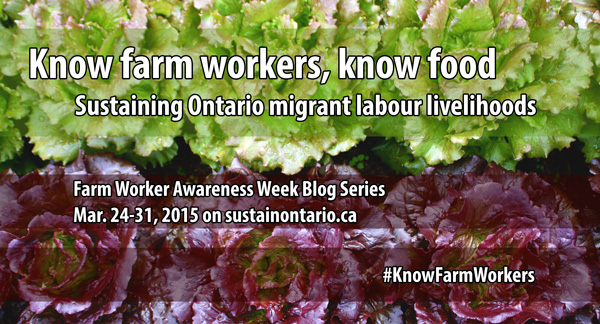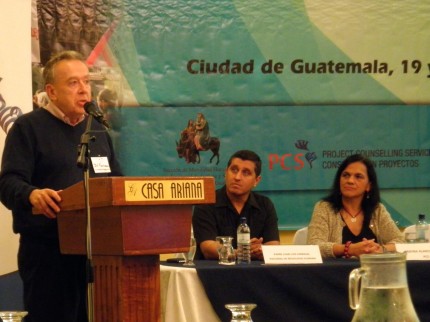Farm workers and food activism in Canada: Unearthing root causes of injustice
Posted: March 25, 2015
Categories: News from Sustain Members / Research

As part of Farmworker Awareness Week (March 24-31st, 2015), this blog series highlights some of the ideas we have gathered over the past several months on promoting healthier, more sustainable farm worker livelihoods. Check out the bottom of this post for background detail on this community research partnership between Sustain Ontario and the University of Toronto.
Issues affecting migrant farm workers have tended to be under-addressed in Canada’s food movement. However, a handful of organizations are building cross-border partnerships to support migrants in addressing their own needs. They are asking how safety and equitability for farm workers can form the heart of efforts to build a more vibrant food system.
Just work?
While harvesting vegetables on a Quebec farm, José Sicajau saw his Quebec employer hit a co-worker with a pipe. Sicajau and another co-worker reported the incident. However, when he applied to return to Canada from Guatemala for farm work as he had been doing for four years, he found he had been blacklisted.
As a result of his experiences, Sicajau helped found the Association of Guatemalans United for our Rights (AGUND), which advocates for the Guatemalan Ministry of Labour to ensure the well being of Guatemalan farm workers overseas. AGUND now includes 200 members, some of whom have had similar experiences of being blacklisted after speaking out, refusing Canadian farm employers’ demands for excessive hours, or raising concerns about on-site accommodations. Some incurred debts after paying private recruiters to secure a job for them, and they had been counting on income from Canada’s migrant farm worker program to support their families. Many members of AGUND would like to return to Canada for farm work, but they are calling for fair treatment and better rights.
Inter Pares, an Ottawa-based NGO, has been collaborating with AGUND for the past several years, helping to build AGUND’s capacity to lobby the Guatemalan government and spark transnational conversations around food justice. This reflects Inter Pares’ “solidarity, not charity” approach to partnerships throughout the world focused on globalizing peace and justice.

The “Just Work?” Tour at the Windsor Workers Action Centre. (L-R) Father Juan Luis Carbajal Tejeda, José Sicajau, Bill Fairbairn, Diego Lorente and other participants. Photo: Inter Pares
In 2012, Inter Pares invited Sicajau and other Guatemalan partners to Canada as part of Just Work? A Solidarity Tour in Support of Migrant Workers Rights. The tour included 20 meetings with government leaders, food activists, and migrant justice groups in nine Canadian cities. The Guatemalan delegates spoke about changes needed in the temporary farm worker program and shared ideas on how to embed fairness for farm workers in efforts to build a healthier food system.
Inter Pares has continued to build on the relationships founded during this tour, particularly through collaborations with Justicia for Migrant Workers (J4MW). At Food Secure Canada’s National Assembly in Halifax last November, Inter Pares and J4MW co-hosted a presentation on food justice and migrant farm labour. Shortly after, they headed to Guatemala City to co-present at the 2nd International Meeting on Temporary Migrant Workers, which brought together workers, activists and Guatemalan government officials to develop strategies ensuring equitable, safe and secure conditions for migrant workers.
Politicizing Canada’s food movement
“Inter Pares’ role is always to try and make the connection with international processes and look at root causes of the situation,” says Eric Chaurette, who works with Inter Pares and serves as Vice Chair at Food Secure Canada. “So not only did we hear about José’s experience on the farm in Quebec, but we also heard about the conditions in Guatemala as well and sort of the pull and push factors. Why do people have to resort to migrate to work? Why do they have to abandon their families for so long? It enables us to talk about other underlying issues such as land concentration and the need for land reform. So our role has been really to politicize the food movement a lot further. It’s quite political, but it needs to go even further.”
What might this politicization of Canada’s food movement look like?
Between 2008-2011, Inter Pares was one of the lead organizations helping Food Secure Canada execute what Chaurette calls a “massive democratic process” through the People’s Food Policy Project. “We had kitchen table talks organized across the country. Over 3000 people participated, and there was this issue around migrant labour. And that was an uncomfortable question because some of the really progressive, environmentally-friendly farm operations were actually saying ‘Well, you know, we need to resort to this type of labour more and more.’” Recognizing that farmers and farm workers alike depend on Canada’s temporary foreign worker program, Chaurette clarifies that Food Secure Canada is not opposed to migrant labour. Instead, it is advocating for migrant farm workers’ rights to be equivalent to those of Canadians, including access to healthcare, decent housing and wages, and the option of citizenship. Its demands on behalf of farm workers are articulated as part of a suite of policy recommendations and analysis in the People’s Food Policy report.
Not merely “units of labour that pick apples”
 Bill Fairbairn, Inter Pares’ Latin America Program Manager, echoes Chaurette’s point that Inter Pares is not interested in vilifying Canadian farmers. “There are a lot of farmers that have developed positive, respectful relationships with the workers they employ. … But the structure of the program and the system in itself create a distorted work dynamic and lend themselves to abuses because a worker’s visa is tied to a single employer. So if a worker is having a problem and is on one farm, he or she can’t just switch to the next farm. Instead, the workers frequently maintain silence and don’t report abuses that occur because they face the constant threat of being sent home or of not being able to return the next season.”
Bill Fairbairn, Inter Pares’ Latin America Program Manager, echoes Chaurette’s point that Inter Pares is not interested in vilifying Canadian farmers. “There are a lot of farmers that have developed positive, respectful relationships with the workers they employ. … But the structure of the program and the system in itself create a distorted work dynamic and lend themselves to abuses because a worker’s visa is tied to a single employer. So if a worker is having a problem and is on one farm, he or she can’t just switch to the next farm. Instead, the workers frequently maintain silence and don’t report abuses that occur because they face the constant threat of being sent home or of not being able to return the next season.”
Another key part of Inter Pares’ work, according to Fairbairn, has been to underscore the socio-economic and political contexts that oblige people to take part in these programs, and to support spaces where the workers themselves can tell their stories. “The women and men that take part in these programs, often at great personal cost, are not just units of labour that pick apples or whatever and that’s all they’re good for. They are human beings who have real needs and concerns.”
With this in mind, Inter Pares and J4MW have been collaborating on a documentary with filmmaker Min Sook Lee called Migrant Dreams. It shares stories of women who sacrifice protracted separation from their loved ones while working in Canada’s temporary farm worker program. Fairbairn feels that Ontario’s agricultural towns can play a part in reducing migrants’ isolation and the difficulty of familial separation by actively welcoming them as valued members of our communities: “I think it’s important as people become aware, that they help build bridges as well with migrant workers so that they feel more connected to the place they’re at.”
5 Key ideas from Food Secure Canada and Inter Pares for Ontario’s food movement to advance justice with migrant farm workers
- 1. Strengthen the enforcement of social protections migrant farm workers and their advocates have called for: Specifically, the People’s Food Policy advocates for “Enforced legislation to ensure that non-citizen workers on farms are fairly treated; given decent housing and wages; enjoy safe and humane working conditions; have access to health care and citizenship rights, all without reprisals.”
- 2. Prevent exploitation by private recruiters: Ontario can look to Manitoba’s Worker Recruitment and Protection Act as a model for legislation that protects migrants from extortion by private recruiters in Canada who charge a fee for securing a job, which violates some provincial laws and international human rights codes.
- 3. Shift the norms and culture among farmers around worker hiring practices and treatment: This can involve establishing workplace-specific policies of pay equity and a progressive seniority system, exploring co-operative forms of ownership, and explicitly valuing the unique skills and experiences migrants bring.
- 4. Build awareness and community: By actively welcoming and building friendships with migrant farm workers, those living in Canada’s rural communities year-round can help to reduce the isolation migrants often feel while separated from their families for extended periods.
- 5. Address root causes of migration: Poverty and associated political conflict, unemployment, climate change and land dispossession are just some of the reasons migrants need to seek employment abroad. It is important to ask about Canada’s role in some of the factors that prompt migrants to move (e.g. the North American Free Trade Agreement meant that nearly two million Mexican farmers lost their livelihoods when their country was flooded with subsidized U.S. corn). People in Canada can also build transnational partnerships with grassroots initiatives in migrants’ countries of origin that are working to reduce the need to migrate by strengthening desirable local livelihood options.
Sustain Ontario’s mission is to support food systems in Ontario that are “healthy, equitable, ecological and financially viable through collaborative action.” We recognize, however, that important gaps exist in improving equitability and financial viability for both farmers and hired farm workers, particularly for migrant farm workers. To that end, over the past several months Sustain Ontario has partnered with University of Toronto sociology doctoral student Anelyse Weiler on a service-learning project related to her research on migration, farm labour and food sovereignty. In light of the complexity of this issue, our aim is to highlight a range of perspectives in order to point toward possible actionable solutions that better meet the needs of all eaters, farmers and farm workers.
We invite all readers to participate in this ongoing conversation by commenting on the blog post series, on Sustain Ontario’s Facebook page, tweeting @SustainOntario, or emailing anelyse.weiler@mail.utoronto.ca. Feel free to use the hashtag #KnowFarmWorkers. How should Sustain Ontario take action on this issue? Please share your thoughts in the following short survey.
Create your free online surveys with SurveyMonkey , the world’s leading questionnaire tool.
One response to “Farm workers and food activism in Canada: Unearthing root causes of injustice”
Leave a Reply
You must be logged in to post a comment.

[…] has legally committed to multiculturalism policy. Food system sustainability organizations like Food Secure Canada and migrant justice groups have argued that migrant farm workers hired through either SAWP or […]